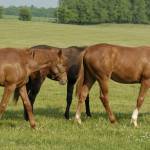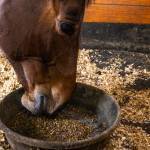Probiotic Effects on Mucosal Health, Immunity in Horses

Owners frequently supplement horses with probiotics, especially products containing Lactobacillus spp., Bifidobacterium spp., Enterococcus spp., and Saccharomyces spp. These live microorganisms reportedly exert beneficial effects, including:
- Reduce pathogenic (disease-causing) bacteria by excluding them from the intestinal tract;
- Producing antimicrobial peptides;
- Inactivating bacterial toxins;
- Inducing and immunomodulatory effect; and
- Increasing mucus production in the intestinal tract, providing a mechanical barrier to ward off pathogens.
“In terms of the immunomodulating properties, probiotics are believed to strengthen the tight junctions in between individual intestinal cells to minimize ‘leaky gut.’ In addition, probiotics may stimulate the production of secretory immunoglobulin A, SIgA, which is an antibody that plays an important role in fighting infection at mucosal surfaces, like the lining of the intestinal tract,” explained Kathleen Crandell, Ph.D., a Kentucky Equine Research nutritionist.
To determine if administering long-term probiotics affected mucosal immunity based on levels of SIgA in the feces, 12 horses were recruited. Six were supplemented with a probiotic mixture for 84 days. The remaining six horses served as the control group. Fecal SIgA was measured in all horses on day 0, 28, 56, 84, and 112.
“No significant differences in SIgA levels in the feces of any of the horses in either the control or treatment group were observed, suggesting the probiotic did not alter mucosal immunity,” said Crandell.
“This may be due to the type of strains used in the supplement, colonization potential, composition and interaction of the supplement components with intestinal epithelial cells,” wrote the research team as a potential explanation.
Studies in mice and humans, however, show an increase in SIgA after supplementing with probiotics, prompting the researchers to suggest conducting additional studies using other probiotic strains.
“Mucosal immunity is vital to horse health,” asserted Crandell. The layer of mucus lining the digestive tract acts as the first line of defense to stop pathogens and toxins from moving from the lumen, or inside, of the intestinal tract to the body and systemic circulation.
“Key to supporting the beneficial microbial population responsible for maintaining a healthy mucosal layer is preserving the proper pH in the digestive tract, which can be achieved with the help of EquiShure, the only hindgut buffer available for horses,” Crandell explained.
EquiShure uses patented encapsulation technology to ensure the buffer is released slowly and directly in the hindgut to help protect the lining of the gastrointestinal tract and support the resident microbiome.
*Żak-Bochenek, A., P. Żebrowska-Różańska, J. Bajzert, et al. 2025. Investigating the potential immunomodulatory effects of commercial oral probiotic supplements on equine gastrointestinal tract barrier function. Frontiers in Immunology 15:1487664.







